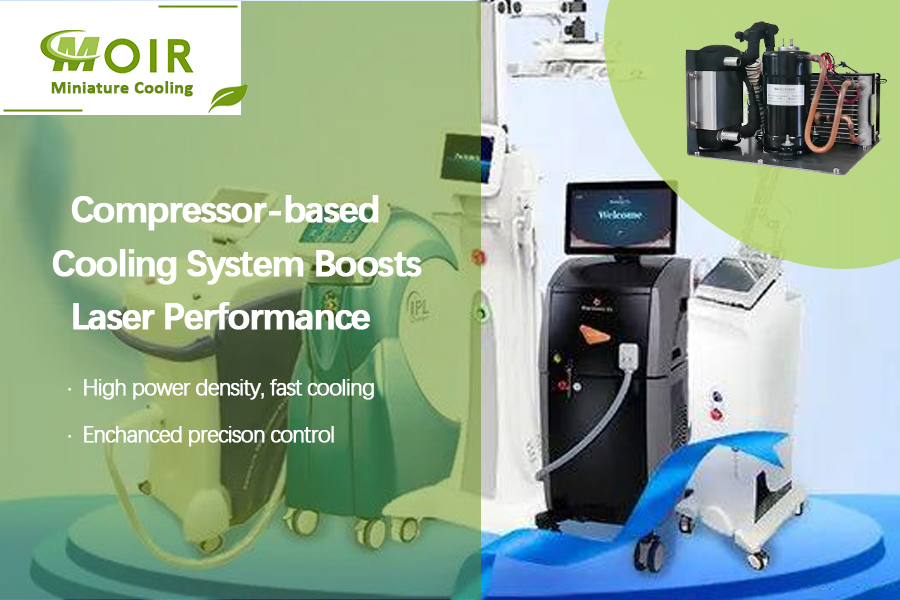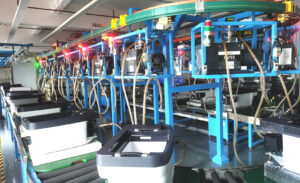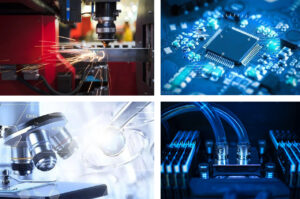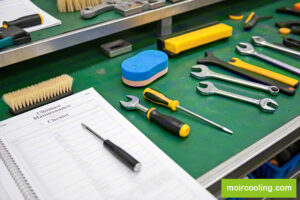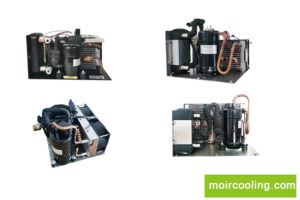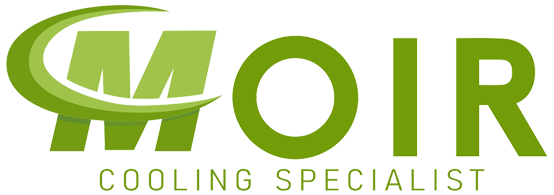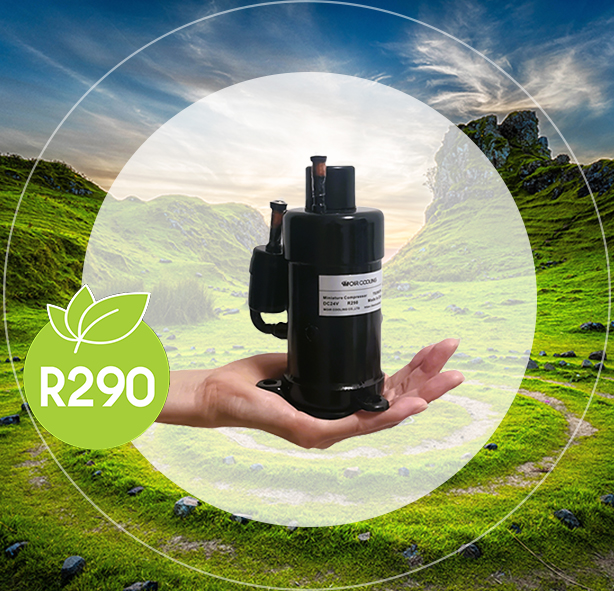Application Background
From laser hair removal and tattoo removal to minimally invasive surgeries and body contouring treatments, medical aesthetic systems that use lasers to accomplish procedures play a pivotal role. While throughout the duration of the treatment, the medical equipment including lasers often becomes very hot and results in discomfort, skin irritation, or uneven cooling distribution. A form of effective cooling solution to maintain optimal thermal management is crucial. The traditional cooling methods, refrigeration-based or liquid chillers have been applied to make the patient feel cool during treatment but they are large structures and cost much to install and operate. The widespread thermoelectric cooling system is relatively compact, but it has a high power consumption and limited cooling capacity. Its cooling performance effect is dependent on the ambient temperature which makes matters complicated.
However, the future of cooling systems had to be not only particularly compact but also exceptionally powerful, with a low noise and vibration level. Additionally, it als had to be extremly lightweight. In the ever-advancing fielf of medical aesthetics, the equipment engineers and integratores need to keep the medical equipment size, operation noise, and power consumption at a minimum level while incorporating thermal managment systems. Good news is that new technologies are constantly pushing the boudaries of what’s possible. Among these advancements, the water cooling systems based on miniature compressor technology has emerged as a true game-changer, revolutionizing not just the performance of medical aesthestic devices but also the outcomes achieved for patients.
The Essence of Compressor Cooling System
Compressor cooling systems work by utilizing a refrigerant cycle to absorb heat from a designated space and dissipate it into the atmosphere. In the context of medical aesthetics, these systems are integrated into devices to regulate and control their operating temperatures. By efficiently removing heat from the system, compressor cooling systems ensure that devices function within their optimal performance range.
This is crucial for ensuring the safety and effectiveness of treatments such as lasers, IPL (Intense Pulsed Light), and radiofrequency procedures.
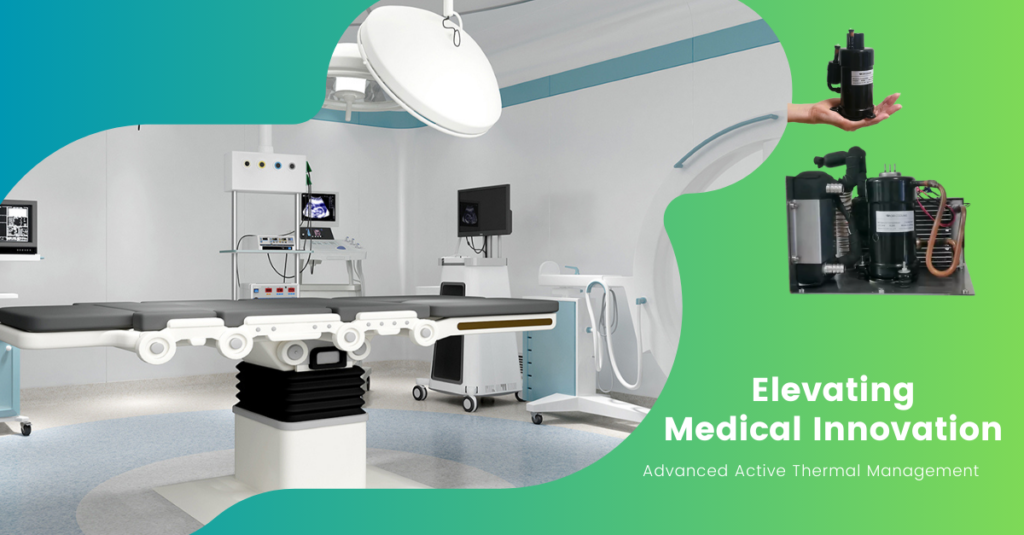
How Compressor Cooling Systems are Changing the Game
- Space Efficiency: Traditional cooling systems often require large spaces due to their bulky nature. However, the new small compressor cooling systems are designed with a focus on space efficiency, making them ideal for medical facilities where space is at a premium. This compactness not only saves space but also ensures that these systems can be easily integrated into various medical settings without compromising on functionality.
- Enhanced Safety: Heat is a significant factor in the safety of many medical aesthetic treatments. One of the most significant impacts of compressor cooling systems is in improving the safety of medical aesthetic treatments. Many procedures, such as laser hair removal and skin resurfacing, involve the application of intense heat to the skin. Without effective heat dissipation, these treatments can pose a risk of thermal damage, leading to burns, scars, or other complications. By maintaining precise temperature control, compressor cooling systems significantly reduce these risks, ensuring patients undergo treatments in a safe and secure environment.
- Improved Treatment Outcomes : By maintaining optimal device performance, these compact cooling systems ensure that treatments are delivered precisely and effectively. Whether it’s laser skin rejuvenation or IPL acne reduction, patients can expect faster results and more significant improvements with fewer treatment sessions. The consistent and reliable performance of medical aesthetic devices, enabled by compressor cooling systems, leads to more satisfied patients and higher customer retention rates.
- Enhanced Patient Comfort : Long treatment sessions or procedures that generate excessive heat can often be uncomfortable for patients. The mini liquid chillers help to address this issue by effectively dissipating heat from the device, reducing the sensation of warmth or discomfort during treatments. This enhanced comfort level not only improves the patient’s overall experience but also encourages them to undergo multiple sessions or recommend the treatment to others.
- Energy Savings: These small compressor-based water chiller are designed to minimize energy consumption while maximizing performance. They utilize state-of-the-art compressors and insulation materials that ensure superior cooling capabilities with reduced energy usage . This not only helps in lowering operational costs but also aligns with the growing global focus on sustainability and energy conservation.
- Silent Operation: In medical environments, noise levels can be a critical factor affecting patient comfort and recovery. The advanced miniature compressors used in these systems are engineered to operate quietly, ensuring a serene atmosphere that contributes to a better patient experience. This feature is particularly beneficial in procedures requiring high precision and calmness, such as laser treatments or cosmetic surgeries.
MOIR Micro Cooling Systems Solution – New Enabling Technology for Aesthetic Laser
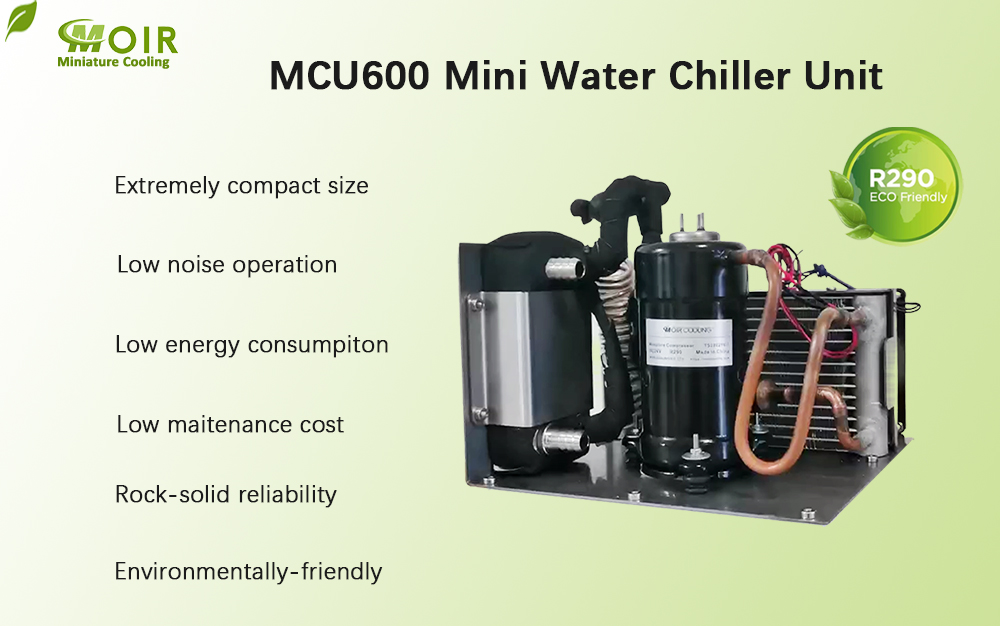
At MOIR, we has been dedicated to miniature cooling solutions for decades and gained a good reputation in the market. The MCU600 is a next generation benchtop reciculating chiller module that combines advanced compressor cooling with high performance heat exchanger technology. The compact refrigeration unit employs miniature, BLDC rotary refrigeration compressor with advanced drive controller to deliver 600 watts ( temeprature dependent) of cooling power, while offering precise temperature control stability and variable-capacity for energy efficiency. With natural R290 refrigerant configuration, the MCU600 has a lower enviromental impact compared to traditional R-134a and R404 options, contributing to reduced carbon footprint. Additionally, the twin-motor compressor design incorporates features that enchance energy efficiency, further supporting sustainable practices in medical facilities.
The portable liquid chiller module MCU600 weighs 3.6kg and size 197x190x148mm only, which is significantly lighter and smaller than widespread thermoelectric cooling system. Because it can easily be integrated into the medical equipment and moved from one place to another, reducing the number of cooling systems needed in the facility.
The compact refrigeration units are powered by direct current 24V DC, making it more easily for the medical euqipment applications to obtain the neccessary safety approvals.
Conclusion
The introduction of the compressor cooling system represents a significant leap forward in the medical aesthetics industry. Its compactness, silence, high efficiency, and environmental friendliness make it an invaluable asset for medical practitioners seeking to provide high-quality care in a manner that is both effective and responsible.
As technology continues to evolve, we can expect even more innovations that will further revolutionize the way medical aesthetics are practiced today and in the future.

